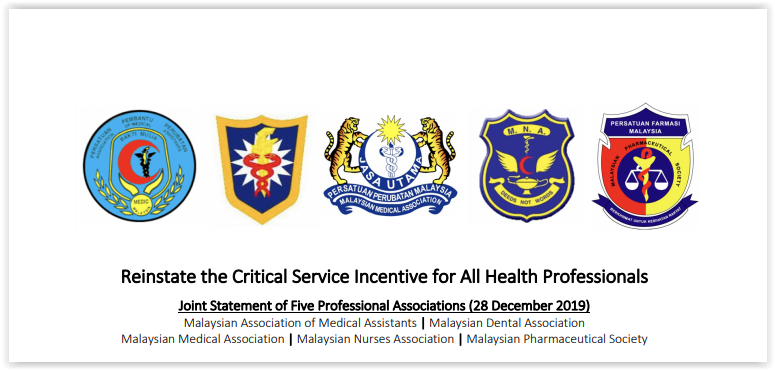KUALA LUMPUR, Dec 29 — Associations representing doctors, pharmacists, dentists, nurses, and medical assistants together demanded for a reinstatement of their critical allowance in the public sector.
In a joint statement, the Malaysian Medical Association (MMA), Malaysian Pharmaceutical Society (MPS), Malaysian Dental Association (MDA), Malaysian Nurses Association, and Malaysian Association of Medical Assistants also called for better terms of service for all health care professionals to retain talent in the civil service.
“We urge the government to reinstate the critical service allowance for all five categories of health professionals,” the five groups said in a statement coordinated by Dr Khor Swee Kheng, who is studying at the Blavatnik School of Government at Oxford University.
“The private health care sector in Malaysia and internationally already pays much more than our public sector, even including the BIPK (Critical Service Incentive Payment). Therefore, appropriately increasing the salaries of our health professionals is the correct direction.
“The Malaysian public health care service cannot lose the human capital that we have invested in over the years, especially to other countries.”
Youth and Sports Minister Syed Saddiq Abdul Rahman announced last Friday that Prime Minister Dr Mahathir Mohamad has decided to postpone abolishing the critical allowance for all professionals across 33 Critical Service schemes in the public sector — including health workers, engineers, architects, and air traffic controllers among others — appointed from January 1, 2020.
The five health professional groups acknowledged that the BIPK was not a permanent allocation, but stressed that health is a critical profession and that it’s unjust if health professionals are not fairly compensated for the same work and in the same service grade.
“The BIPK can be 15 to 25 per cent of take-home pay, a significant amount when the cost of living is rising. If Malaysians want good health care, then we must first help our health professionals adequately care for their own families,” they said.
“Their services and sacrifices cannot be taken for granted, as they are also humans and citizens with rights, emotions and personal needs.
Malaysian Medical Association, Malaysian Pharmaceutical Society, Malaysian Dental Association, Malaysian Nurses Association, and Malaysian Association of Medical Assistants
The BIPK critical allowance is RM750 monthly for doctors, pharmacists and dentists, and up to 15 per cent of the monthly basic salary for nurses. For other professionals in the civil service, including engineers and air traffic controllers among others, it’s between 5 and 10 per cent of their monthly basic salary.
The health professional associations also attributed the “over-supply” of health professionals in the public sector partially to the need for more posts in the Health Ministry to deliver effective health care to Malaysians.
“There are also ten other criteria to decide on the BIPK, and health professionals fit at least seven of them: cost of living; hardship; specialisation; additional competencies; uniqueness of service; importance of retention; and encouragement,” they said.
According to the groups, 130,000 doctors, doctors, medical assistants, nurses, and pharmacists from the government sector save lives in cities, villages, and remote jungles from Arau, Perlis, to Tuaran, Sabah.
“They work long hours in an ‘underfunded, understaffed, overworked and overstretched’ service, sacrificing nights, weekends and holidays at physical and emotional cost to themselves and their families.
“Many are motivated by duty and patriotism, remaining in the civil service despite better pay and environment in the private sector or other countries,” said the groups.
Effective care can’t be delivered, they noted, if public health professionals are not compensated fairly, have low morale, are distracted by the reality of their financial commitments, or constantly leave the service.
“Health care is a critical service to Malaysia, and better health will lead to social and economic progress.”
The joint statement was signed by MMA president Dr N. Ganabaskaran, MPS president Amrahi Buang, MDA president Dr Leong Kei Joe, Malaysian Nurses Association president Sharipah Asiah Syed Junid Aljunid, and Malaysian Association of Medical Assistants president Haji Mustafa Abd Majid.
In a separate statement, MMA also proposed setting up a Healthcare Service Commission to improve the quality of health care delivery and public health workforce management, including setting remuneration scales and promotion rules.








